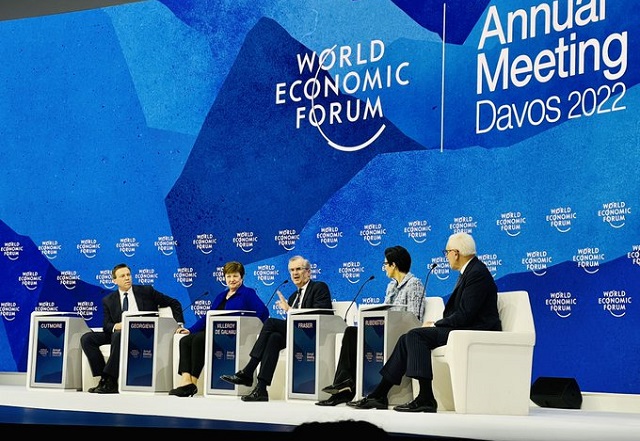Many issues reflective of the current geopolitical situation in light of the Ukraine conflict, as well as the rising interest rates and spiking energy costs, are exacerbating long term Davos concerns
by Victor Cherubim
We are told that the world political and business summits including its leaders are able to work around differences whilst Ukraine is caught in a frozen conflict, with sanction busting in evidence.
We hear European nations sending weapons to Russia, despite an embargo on arms shipments. France, Germany, and Italy among others, have evaded the arms embargo. France has sent thermal imaging, cameras and navigation systems, whilst Germany “has sent bombs, rockets and missiles,” in total US$ 95 million of hardware to pay for the Russian Gas.
What does this mean?
It is mostly the poorer nations that have to abide by the rules, while the rich find ways to get off scot-free, or so it seems. Can we complain, hardly not?
Ironically, as time wears on, the war in Ukraine seems to have fallen down the agenda in the West, with resources and capital slowly receding, or flowing in, in its eagerness it claimed, since 24 February 2022. But, if this happens or not, it could take years, perhaps, decades to rebuild Ukraine, as much of it has been levelled and economic devastation is for both Ukraine and Russia. Was this what the West indirectly plodded, rather plotted Russia, to subdue?
Priorities for the West keep changing like the weather, depending on strategies. In the three months gone by, the priority was to set Russia at odds with China, making China in an uncompromising position to send arms to Russia. China cleverly did not fall into this trap. Now that the West has isolated Russia using Ukraine as its “punch bag”, at least to a large extent, it has weakened Putin. The more sanctions bite, it is harder for Russia to reinvest in their war machine, at least for a time, or sometimes?
The new Atlantic Drift
We now witness a shift in emphasis to China. Who knows, if it is to upset the equilibrium. The United States has got India, and Japan together with the newly elected AustralianLabor Prime Minister, Anthony Albanese, to join a QUAD Summit in Tokyo on 24 May 2022. India with its uncompromising friendship with Russia is able to join Japan, Australia and the US, as QUAD, coming together to launch a maritime initiative aimed at curbing China, using satellite technology to create a tracing system on China for any threats to Taiwan as well as so-called China’s illegal fishing in the East and the South China Sea.
“The pot must always be kept boiling” so seems like the motto of Western strategy? Besides, we understand that many other issues will also feature in the QUAD Summit.
Davos
Davos Economic Summit, the first forum in two years, due to the pandemic, is meeting on 22 -26 May 2022, with calls for fresh taxation of the wealthy to tackle the cost of living crisis.
To the ordinary reader, developments in the Economics Summit at Davos, Switzerland and Defence and Security Summit at the Quad Summit in Tokyo, Japan, are two worlds apart. Perhaps, in distance, but for all intents and purposes, they have much in common.
Many issues reflective of the current geopolitical situation in light of the Ukraine conflict, as well as the rising interest rates and spiking energy costs, are exacerbating long term Davos concerns including the need to tackle inequality and to provide “work for workers with new work skills,” with a drive for a job’s recovery.
This theme is, perhaps, added this year with a “Marshall Plan” style investment in Ukraine’s eventual construction, how to handle Ukrainian refugees and how to stem a food and cost of the living crisis spreading from the “breadbasket of Europe.”
Added to this is the Climate Change crisis as net-zero pledges have not been delivered as promised at Glasgow last year, and neither is the surge in investment needed to cut emissions.
Volodymyr Zelinski address to Davos
While at Davos there are calls for fresh taxation of the wealthy to tackle the cost of living crisis, more than 250,000 UK households are predicted to slide into destitution and about 1.2 million in extreme poverty, unless the Government acts to help the poorest hit by huge rises in food and energy prices.
In an attempt to cut food prices, options are now being suggested and are now available to bring in cheaper food from the EU to Britain. The National Farmers Union is, however, concerned over standards of produce.
President Zelinski of Ukraine today 23 May 2022, addressed world leaders at a virtual conference at Davos. He accused Russia of stealing food supplies by blocking its Black Sea ports. He has stated that a corridor must be established to allow exports of wheat and sunflower oil.
He admonished by stating that Ukraine is short on time and advised his Davos audience to wake up each morning with the feeling, “what have I done for Ukraine today?”
He wants Ukraine to create the conditions where people and businesses are not afraid to exist and thrive. That will include an up to date defence system, the most modern, multimodal Defence and security. He concluded by asking his audience: “Will brute force rules the world?”












Post a Comment